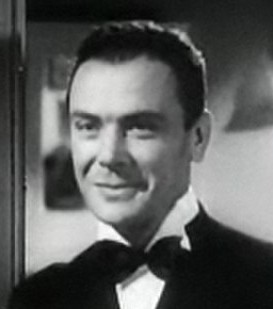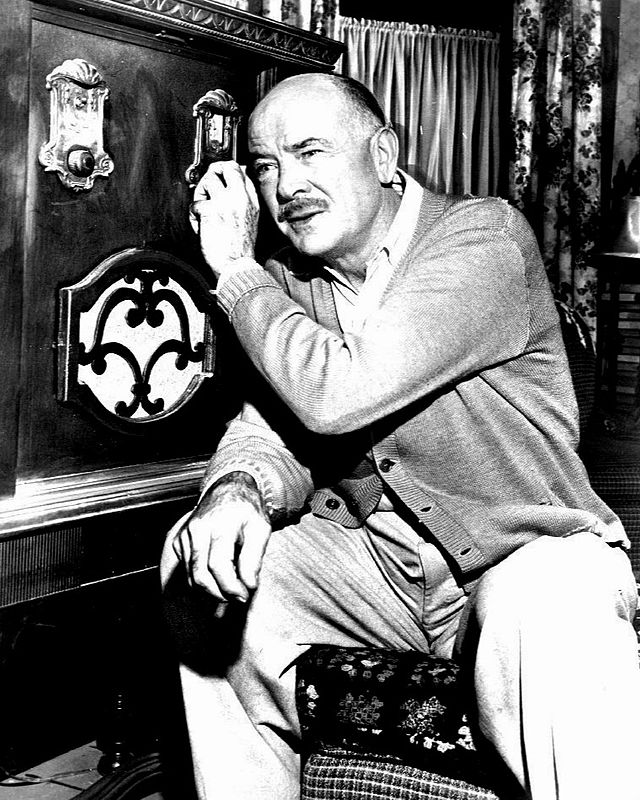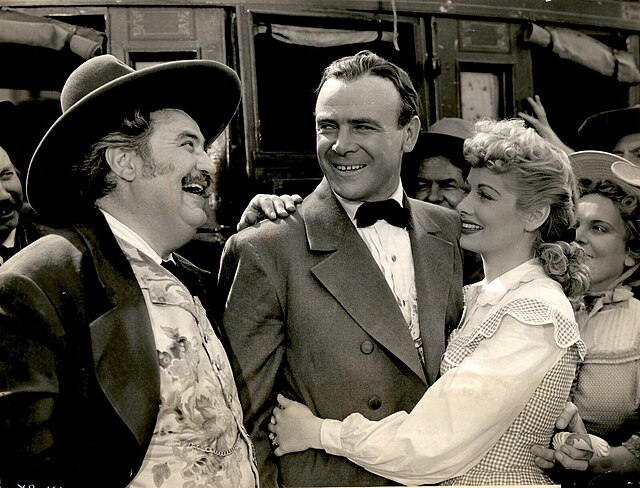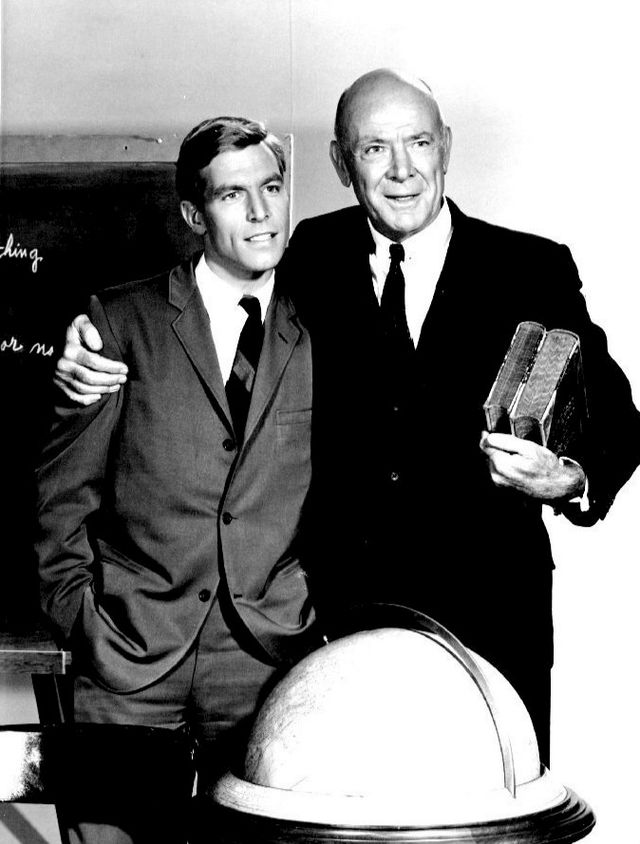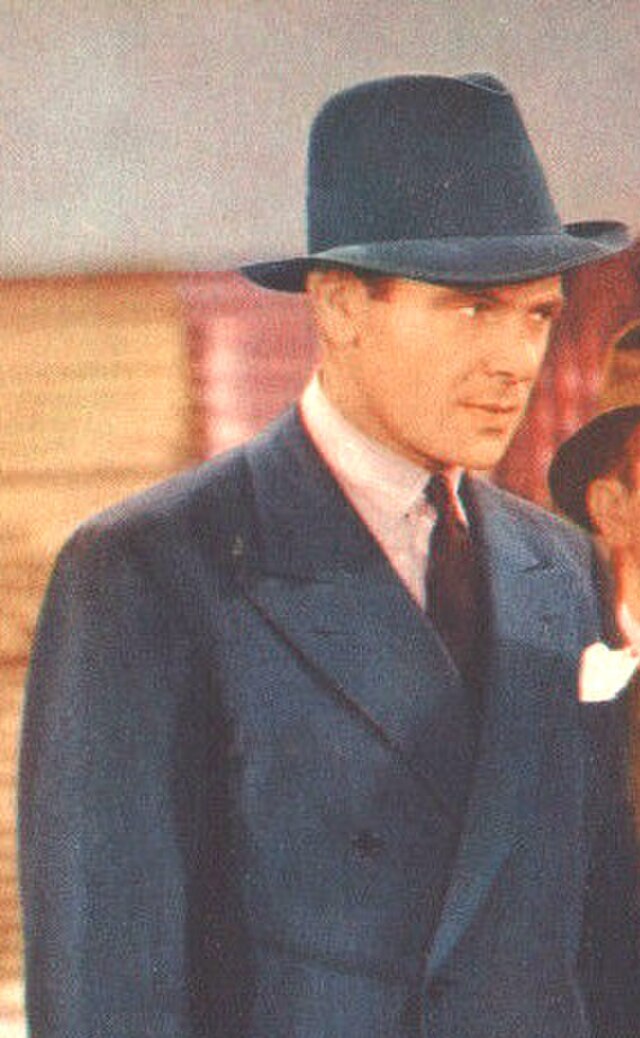Dean Jagger
back| Full Name | Dean Jeffries Jagger |
| Stage Name | Dean Jagger |
| Born | November 7, 1903 |
| Birthplace | Columbus Grove, Ohio, USA |
| Died | February 5, 1991 (aged 87) |
| Buried | Sunset Lawns Cemetery, Elkhart, Indiana, USA |
| Married to | Antoinette Lawrence (divorced) - Gloria Ling (married 1958–1991; his death) |
| Children | One adopted daughter with Gloria Ling |
| Notable films | Twelve O'Clock High (1949) - White Christmas (1954) - Brigham Young (1940) - The Robe (1953) - King Creole (1958) |
Dean Jagger
Mr. Dignified Restraint
Dean Jagger (1903–1991) was a distinguished American actor known for his quiet authority and understated style. Born in Ohio, he began as a teacher before studying drama in New York. He gained early recognition portraying Brigham Young (1940), but his defining role came in Twelve O’Clock High (1949), earning him an Academy Award for Best Supporting Actor.
Jagger excelled at playing thoughtful, principled men in films like White Christmas, Elmer Gantry, and The Robe, and brought dignity to television as Principal Vane in Mr. Novak.
Though private by nature, he was deeply respected in the industry. He married model Gloria Ling in 1958 and adopted a daughter. A convert to the LDS Church, he remained grounded in his beliefs. Jagger passed away at 87, leaving behind a legacy of nuanced, emotionally rich performances that stood the test of time.
Related
Dean Jagger (1903 – 1991)
Biography and Film Career
Dean Jeffries Jagger was born on November 7, 1903, in the small farming community of Columbus Grove, Ohio. He was the second of three children in a modest Midwestern family. Raised with traditional values and a strong work ethic, Jagger spent much of his youth in Lima, Ohio, where his early life on the family farm helped forge the calm, steady demeanor that would later define many of his most memorable screen roles.
From an early age, Jagger exhibited a quiet intelligence and a thoughtful nature. After high school, he enrolled at Wabash College in Indiana, but he left after only a year, feeling a strong pull toward performance and storytelling. His natural curiosity and creative instincts ultimately led him to Chicago, where he found work as a schoolteacher—an experience that would later inform his acting, particularly his roles as principled authority figures.
Realizing that his true passion lay in the arts, he moved to New York City and enrolled at the American Academy of Dramatic Arts, one of the most prestigious acting schools in the country. There, he honed his craft and began performing on the stage. His strong presence and contemplative style helped him stand out in a sea of aspiring actors.
Early Career and Rise to Stardom
Dean Jagger made his film debut in 1929 in The Woman from Hell, a silent film during the final days of the silent era. Like many actors of the time, he initially struggled to find his place in the rapidly evolving film industry. Through the 1930s, he played a variety of supporting roles, often portraying mild-mannered or morally upright men.
His breakthrough came in 1940, when he was cast as the titular character in Brigham Young, a major production by 20th Century Fox. The film was a turning point, showcasing his ability to embody leadership and moral complexity. His portrayal of the Mormon leader was widely praised, and the experience would later influence his personal spiritual journey—he converted to The Church of Jesus Christ of Latter-day Saints (Mormonism) in the 1970s, many years after playing Brigham Young.
Jagger’s most critically acclaimed performance came in 1949 with Twelve O'Clock High, in which he played Major Harvey Stovall, a former judge turned military officer. The film, centered on the psychological toll of leadership during World War II, was both a commercial and critical success. For his performance, Jagger won the Academy Award for Best Supporting Actor, solidifying his reputation as a commanding yet understated screen presence.
Throughout the 1950s and 1960s, Jagger worked steadily in both film and television. He appeared in major films such as The Robe (1953), White Christmas (1954), Bad Day at Black Rock (1955), and Elmer Gantry (1960). He was known for portraying men of principle—judges, generals, and professors—with a quiet but compelling intensity.
On television, he starred in the drama series Mr. Novak (1963–1965), playing the thoughtful and idealistic high school principal Albert Vane. His role on the show earned him critical praise and resonated with viewers who appreciated his quiet authority and moral depth.
Personal Life and Passions
Despite his fame, Jagger was known for being intensely private. He was not a part of the Hollywood party scene and preferred a quieter lifestyle. Friends and colleagues described him as introspective, kind, and highly intelligent. He had a deep love for history, philosophy, and spiritual matters, and he often read voraciously between takes.
Jagger also had a strong interest in aviation and World War II history, which added authenticity to his role in Twelve O’Clock High. He was known to be fascinated by military strategy and the psychology of leadership under pressure—topics that deeply informed his acting.
Marriages and Family
Jagger was married twice. His first marriage, to Antoinette Lawrence, ended in divorce. The couple reportedly struggled with the pressures of his career and the demands of Hollywood life. In 1958, he married Gloria Ling, a former model. The two remained devoted to each other for over three decades. Together, they adopted a daughter, and Jagger embraced fatherhood with quiet pride and devotion.
Gloria provided stability and support in his later years, especially as he began to work less frequently. The couple lived quietly in California, largely avoiding the limelight.
Later Years and Death
In the 1970s and 1980s, Dean Jagger slowed his pace, accepting fewer roles and spending more time with family and in reflection. His final film appearance was in Game of Death (1978), a martial arts movie starring Bruce Lee, in which Jagger played the role of a scheming crime boss. The film was released posthumously for Lee and included archival footage, but Jagger's performance was newly shot.
Jagger lived into his late 80s and remained mentally sharp and physically active well into old age. He died on February 5, 1991, at Santa Monica Hospital in California, of natural causes. He was 87 years old.
He was buried at Sunset Lawns Cemetery in Elkhart, Indiana, a quiet resting place far from the Hollywood spotlight—a fitting final chapter for a man who spent his life playing roles of quiet dignity and strength.
Legacy
Dean Jagger’s legacy is one of substance over flash. He was never a conventional leading man, but he brought depth, intelligence, and quiet power to every role. With over 90 film and television credits, he remains a respected figure in Hollywood history. His Academy Award win and memorable performances in films like Twelve O’Clock High and White Christmas continue to earn him admiration among film historians and classic movie fans.
Dean Jagger – Physical Attributes
- Height: Approximately 6 feet (183 cm)
- Build: Medium; lean but sturdy, often described as “solid” or “athletically average”
- Hair: Light brown to sandy gray in later years, often combed back or to the side
- Eyes: Hazel or light brown (exact sources vary)
- Complexion: Fair
- Voice: Deep and measured with a slight Midwestern cadence—calm, authoritative
Distinguishing features:
- Calm, contemplative expression
- Clear-lined facial features that aged into a distinguished, weathered look
- Frequently wore glasses in later roles, enhancing his intellectual persona
Dean Jagger Video Tribute
Dean Jagger: A Study in Quiet Authority and Emotional Precision
Dean Jagger’s acting style was characterized by an understated intensity—an ability to project moral weight, quiet wisdom, and emotional depth without resorting to overt dramatics. In an era when many of his contemporaries leaned on theatrical flourishes or screen charisma, Jagger made his mark through restraint, subtlety, and quiet command.
The Power of Stillness and Silence
One of Jagger’s most defining traits was his mastery of stillness. He could hold the screen without speaking a word, using silence, facial expression, and body language to convey internal struggle or resolve. In Twelve O’Clock High (1949), for example, much of his Oscar-winning performance hinged on how he carried the burdens of war and duty not through fiery speeches, but through measured pauses, downcast eyes, or the simple adjustment of a pair of glasses.
His performances often gave the impression of a man reflecting inwardly—an actor who brought the full weight of a character’s backstory to the surface through restraint rather than exposition. This gave his roles a sense of realism and gravity, as if the characters had truly lived lives before the camera started rolling.
A Voice Like a Weathered Instrument
Jagger’s voice was another crucial tool—low, firm, and tinged with a natural warmth. Whether playing a judge, a general, or a teacher, his measured vocal delivery conveyed intelligence, decency, and a touch of melancholy. He often sounded like a man who had seen too much and chosen his words carefully. There was no grandiosity, but rather a thoughtful cadence that invited trust.
Roles of Moral Substance
Casting directors often gravitated toward Jagger for roles requiring moral authority. He portrayed fathers, preachers, military officers, and teachers not as saints, but as flawed yet principled men, struggling to do right in a complicated world. This aligned perfectly with his screen presence: he did not need to dominate a scene physically—he brought emotional gravity, integrity, and lived-in experience.
This authenticity made him ideal for roles that required a quiet but immovable presence. As Principal Vane in the TV series Mr. Novak, for instance, he gave depth to a potentially static role, making the principal not a foil or background character, but a thoughtful anchor for the show's idealistic tone.
Emotion in Measured Doses
While Jagger rarely gave emotionally explosive performances, when his characters did break emotionally, the impact was immense because it felt earned. He could tremble with grief or harden with disappointment in ways that struck viewers without melodrama. His emotional control made small gestures—a clenched fist, a glance away, a faltering voice—feel momentous.
Physicality Rooted in Realism
Physically, Jagger was not imposing, but he used his frame with deliberate precision. Whether walking with the dignified limp of an aging general or standing firm in a courtroom scene, his physical choices always served the narrative and added to the authenticity of his characters. He moved with the assurance of someone who didn’t need to prove authority—it was simply accepted.
Conclusion: The Actor as Human Mirror
Dean Jagger’s acting style might best be described as a mirror of quiet strength. He was never flashy, never bombastic, but always compelling. He made complex inner lives visible with just a gesture or a breath. His performances invited audiences to trust him, to believe in the dignity of his characters, and to recognize the moral weight of ordinary men trying to do right.
In an industry built on spectacle, Jagger was a quiet craftsman. He gave the kind of performances that aged well—layered, authentic, and resonant long after the credits rolled.
Memorable Quotes from Films
Twelve O’Clock High (1949)
Major Stovall (Dean Jagger)
“I’m afraid we’ve got ourselves a real fighting man. God help us.”
— A quietly ironic line showing Jagger’s gift for understated delivery in a role full of emotional restraint.
White Christmas (1954)
Major General Waverly (Dean Jagger)
“There's no such thing as an old soldier. You either die young, or you live long enough to watch everything change.”
— One of the most heartfelt lines in the film, evoking the dignity and sorrow of retirement and forgotten service.
Elmer Gantry (1960)
William Morgan (Dean Jagger)
“Faith is a stubborn thing. It will not die easily—even in the face of truth.”
— Reflects Jagger’s affinity for roles that wrestled with moral and spiritual complexity.
Brigham Young (1940)
Brigham Young (Dean Jagger)
“We are not wandering. We are being led.”
— A solemn, moving line that encapsulates the film’s theme and Jagger’s commanding calm in the role.
Personal Quotes and Interviews
Dean Jagger gave relatively few interviews, but some remarks have been preserved:
On winning the Oscar (1949):
“I’m not the kind of actor who demands the spotlight. I just try to do the work well—and let the work speak.”
— A humble reflection, often quoted to represent his working ethos.
On his approach to acting:
“Stillness tells a story. If you can be quiet on screen and still hold attention, that’s when you’ve done something.”
— A rare interview comment that aligns with how many described his style: quiet, deliberate, and grounded.
On playing moral characters:
“I like to play men who think. Who wrestle. They don’t have to win—but they have to struggle honestly.”
— Revealing his preference for complexity over heroics in his roles.
Academy Awards
- 1949 – Academy Award for Best Supporting Actor
- Film: Twelve O’Clock High
- Role: Major Harvey Stovall
- Significance: This remains his most prominent accolade. Jagger’s subtle, emotionally rich performance as the quietly observant adjutant in the WWII drama won him widespread acclaim. The award recognized not only his performance in this role but his broader skill as a character actor.
Emmy Awards
- 1964 – Nominated: Primetime Emmy Award for Outstanding Continued Performance by an Actor in a Leading Role in a Dramatic Series
- Work: Mr. Novak (NBC)
- Role: Principal Albert Vane
- Significance: His portrayal of a wise and humane high school principal earned critical respect and brought him to the attention of a new generation of viewers during the television era. Although he did not win, the nomination solidified his standing in the television world.
Hollywood Walk of Fame
- 1960 – Star on the Hollywood Walk of Fame
- Category: Motion Pictures
- Address: 1523 Vine Street, Hollywood, California
- Significance: This honor marked his longstanding contribution to the motion picture industry, celebrating his career as both a leading man and an esteemed character actor across decades.
Other Honors & Legacy
- Widespread Critical Acclaim for Twelve O’Clock High
Beyond the Oscar, this performance is frequently cited in film studies and leadership training for its nuanced portrayal of psychological strain and wartime leadership. - Cultural Legacy
Jagger’s roles in White Christmas, Elmer Gantry, and Mr. Novak remain culturally resonant. He is often referenced as an exemplar of mid-century moral authority in American cinema. - Church Recognition
After converting to The Church of Jesus Christ of Latter-day Saints, Jagger received informal recognition and respect within the church for his portrayal of Brigham Young (1940), which helped portray the Mormon leader with dignity and gravity.
Dean Jagger Movies
1929
- The Woman from Hell – Jagger's film debut as Jim Coakley, a man entangled in a dramatic tale of passion and betrayal.
- Handcuffed – Portrays Gerald Morely in this crime drama involving law enforcement and criminal pursuits.
1930
- Whoopee! – Appears uncredited as a deputy in this musical comedy set in the American West.
1934
- You Belong to Me – Plays a military school instructor in this romantic drama.
- College Rhythm – Acts as Coach Robbins in a musical comedy centered around college life and football.
- Behold My Wife! – Portrays Pete in this drama about love and societal expectations.
1935
- Home on the Range – Features as Thurman in this Western involving cattle rustling and frontier justice.
- Wings in the Dark – Plays Top Harmon in a story about blind aviation and romance.
- Car 99 – Acts as Trooper Jim Burton in this crime drama focusing on state troopers.
- People Will Talk – Portrays Bill Trask in a romantic comedy involving mistaken identities.
- Men Without Names – Plays Jones in a crime film about undercover agents infiltrating gangs.
- Wanderer of the Wasteland – Stars as Adam Larey in this Western about vengeance and redemption.
1936
- It's a Great Life – Features as Arnold in a musical comedy about vaudeville performers.
- Woman Trap – Plays 'Honey' Hogan in a crime drama involving police and criminal underworlds.
- Thirteen Hours by Air – Acts as Hap Waller in an adventure film about an airline flight beset by criminals.
- Revolt of the Zombies – Stars as Armand Louque in a horror film about zombification in Cambodia.
- Pepper – Portrays Bob O'Ryan in a musical comedy involving a young girl's adventures.
- Star for a Night – Plays Fritz Lind in a drama about a family's musical aspirations.T
1937
- Under Cover of Night – Acts as Alan Shaw in a mystery involving a professor's murder.
- Woman in Distress – Features as Fred Stevens in a crime drama.
- Dangerous Number – Plays Vance Dillman in a romantic comedy about a man caught between two women.
- Song of the City – Portrays Paul Herrick in a musical drama about love and ambition.
- Escape by Night – Stars as James 'Capper' Regan in a crime drama about a reporter and a gangster.
- Exiled to Shanghai – Acts as Charlie Sears in an adventure film involving espionage.
1938
- Having Wonderful Time – Uncredited role as Charlie, Emma's husband, in a romantic comedy set at a vacation resort.
1940
- Brigham Young – Stars as Brigham Young in a biographical Western about the Mormon leader's journey west.
1941
- Western Union – Plays Edward Creighton in a Western about the building of the telegraph line.
- The Men in Her Life – Acts as David Gibson in a drama about a ballerina's romantic entanglements.
1942
- Valley of the Sun – Portrays Jim Sawyer in a Western involving land disputes and Native American relations.
- The Omaha Trail – Features as 'Pipestone' Ross in a Western about railroad expansion.
1943
- I Escaped from the Gestapo – Stars as Torgut Lane in a spy thriller about counterfeiters during WWII.
- The North Star – Plays Rodion Pavlov in a wartime propaganda film about Ukrainian villagers resisting Nazis.
1944
- When Strangers Marry – Acts as Paul Baxter in a film noir about a woman suspecting her new husband of murder.
- Alaska – Portrays U.S. Marshal John Masters in an adventure film set during the Alaskan gold rush.
1945
- I Live in Grosvenor Square – Plays Sergeant John Patterson in a romantic drama set in wartime London.
1946
- Sister Kenny – Acts as Kevin Connors in a biographical film about a nurse's fight against polio.
1947
- Pursued – Portrays Grant Callum in a Western noir about a man haunted by his past.
- Driftwood – Plays Dr. Steve Webster in a drama about a girl and her dog in a small town.
1949
- C-Man – Stars as Cliff Holden in a crime film about a customs agent tracking down jewel smugglers.
- Twelve O'Clock High – Plays Major Stovall in a WWII drama about the psychological effects of war on bomber crews; earned him an Academy Award for Best Supporting Actor.
1950
- Sierra – Acts as Jeff Hassard in a Western about a father and son on the run.
- Dark City – Portrays Captain Garvey in a film noir involving gambling and murder.
1951
- Rawhide – Plays Yancy in a Western about a stagecoach station under siege.
- Warpath – Acts as Sam Quade in a Western about a cavalryman's quest for revenge.
1952
- My Son John – Portrays Dan Jefferson in an anti-communist drama about a family's suspicions.
- Denver and Rio Grande – Plays General William J. Palmer in a Western about railroad expansion.
- It Grows on Trees – Acts as Phil Baxter in a comedy about a family discovering money-growing trees.
1953
- The Robe – Portrays Justus in a biblical epic about the crucifixion of Jesus and its aftermath.
1954
- Executive Suite – Plays Jesse Q. Grimm in a corporate drama about power struggles in a company.
- Private Hell 36 – Acts as Captain Michaels in a film noir about police corruption.
- White Christmas – Portrays Major General Thomas F. Waverly in a musical about entertainers helping their former commander.
1955
- Bad Day at Black Rock – Plays Tim Horn in a thriller about a stranger uncovering secrets in a small town.
- The Eternal Sea – Acts as Vice-Admiral Thomas L. Semple in a biographical film about a naval officer's resilience.
- It's a Dog's Life – Portrays Mr. Wyndham in a drama told from a dog's perspective.
1956
- Red Sundown – Plays Sheriff Jade Murphy in a Western about law enforcement and redemption.
- On the Threshold of Space – Acts as Dr. Hugo Thornton in a drama about Air Force test pilots.
- X the Unknown – Portrays Dr. Adam Royston in a science fiction film about a radioactive creature.
- Three Brave Men – Plays John W. Rogers in a drama about a government employee accused of disloyalty.
- The Great Man – Acts as Philip Carleton in a drama about a radio reporter uncovering the truth about a deceased colleague.
1957
- Bernardine – Portrays J. Fullerton Weldy in a musical comedy about teenage romance.
- Forty Guns – Plays Sheriff Ned Logan in a Western about a powerful woman rancher and her conflicts.
1958
- The Proud Rebel – Jagger portrays Harry Burleigh, a compassionate farmer who offers shelter to a war veteran and his mute son, aiding them in their quest for a new life.
- King Creole – He plays Mr. Fisher, the stern father of Danny Fisher (Elvis Presley), a teenager who becomes entangled in the New Orleans underworld.
1959
- The Nun's Story – Jagger takes on the role of Dr. Van Der Mal, the supportive father of Sister Luke (Audrey Hepburn), who struggles with her faith and dedication to nursing.
1960
- Cash McCall – He plays Grant Austen, a business magnate involved in corporate acquisitions, navigating the complexities of love and commerce.
- Elmer Gantry – Jagger portrays William L. Morgan, a religious leader who collaborates with a charismatic preacher in a tale of faith and deception.
1961
- Parrish – He appears as Sala Post, a tobacco plantation owner whose daughter becomes romantically involved with the protagonist, leading to familial tensions.
- The Honeymoon Machine – Jagger plays Admiral Fitch in this comedic tale of naval officers who use a computer to predict roulette outcomes in Venice.
1962
- Billy Rose's Jumbo – He portrays John Noble, the owner of a struggling circus, in this musical featuring a love story set against the backdrop of big-top performances.
1963–1965
- Mr. Novak (TV Series) – Jagger stars as Principal Albert Vane, guiding a young teacher through the challenges of educating high school students, earning critical acclaim for his performance.
1967
- First to Fight – He plays Lt. Col. Baseman in this war drama about a decorated Marine who returns to combat to train new recruits during World War II.
1968
- Firecreek – Jagger portrays Whittier, a town elder who confronts a gang of outlaws threatening the peace of a small frontier town.
- Day of the Evil Gun – He appears as Jimmy Noble, a character entwined in a man's relentless pursuit to rescue his kidnapped family from Native American captors.
1969
- Smith! – Jagger plays Judge James C. Brown in this Western about a Native American boy seeking justice with the help of a compassionate rancher.
- The Lonely Profession – He portrays Charles Van Cleve in this crime drama centered on a private investigator entangled in a web of deceit and murder.
1970
- Tiger by the Tail – Jagger appears as Top Polk, a character involved in a veteran's struggle to clear his name after being accused of murder.
- The Kremlin Letter – He plays the Highwayman in this espionage thriller about a secret mission to retrieve a compromising letter from the Soviet Union.
- The Brotherhood of the Bell – Jagger portrays Chad Harmon in this television film about a college professor uncovering a secret society's influence.
1971
- Vanishing Point – He appears as the Prospector, offering philosophical insights to a driver on a high-speed journey across the American West.
- Incident in San Francisco – Jagger plays Sam Baldwin in this TV movie focusing on a police investigation into a series of crimes in the city.
1972
- The Glass House – He portrays Warden Auerbach in this television film exploring the brutal realities of prison life and corruption.
- Columbo: The Most Crucial Game – Jagger appears as Walter Cunnell in this episode where a football team owner is murdered, and Columbo investigates.
- Kung Fu – He plays Caine's grandfather in the episode "Dark Angel," guiding the protagonist on his spiritual journey.
1973
- Shaft – Jagger guest-stars in this television series about a private detective navigating crime in New York City.
- I Heard the Owl Call My Name – He portrays the Bishop in this TV movie about a young vicar sent to a remote Native Canadian village.
1974
- The Hanged Man – Jagger plays Josiah Lowe in this Western TV movie about a gunfighter seeking redemption.
- The Great Lester Boggs – He appears as Grandfather Vandiver in this film focusing on family dynamics and personal growth.
1976
- The Lindbergh Kidnapping Case – Jagger portrays Koehler in this dramatization of the infamous 1932 abduction of Charles Lindbergh's son.
1977
- End of the World – He plays Collins in this science fiction film about a scientist discovering that aliens plan to destroy Earth.
1978
- Game of Death – Jagger appears as Dr. Land in this martial arts film featuring Bruce Lee, involving a plot about a martial artist forced to fake his death.
1980
- Gideon's Trumpet – He portrays the Sixth Supreme Court Justice in this TV movie about a man's fight for the right to legal counsel.
- Alligator – Jagger plays Slade in this horror film about a giant sewer-dwelling alligator terrorizing a city.
1985
- St. Elsewhere – He appears as Dr. David Domedion in the episode "Cheers," contributing to the medical drama's complex narrative.
1987
- Evil Town – Jagger portrays Dr. Schaeffer in this horror film about a town harboring dark secrets and sinister experiments.

